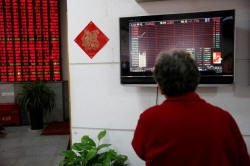|
World stocks and oil edge
higher; sterling reels from Brexit pain
 Send a link to a friend
Send a link to a friend
 [January 10, 2017]
By Dhara Ranasinghe [January 10, 2017]
By Dhara Ranasinghe
LONDON
(Reuters) - World stock markets nudged back toward recent multi-month
highs on Tuesday, aided by a rally in commodity prices, although
sterling slid for a second straight day on concerns over Britain's
future ties with the European Union.
European stock markets, which had opened broadly lower, edged back
toward recent one-year peaks, while U.S. stock futures traded marginally
higher.
The recovery in share prices came as commodities such as copper gained
on further signs of a pick-up in China's economy, while oil prices
stabilized after falling almost 4 percent on Monday on doubts that key
oil producers would cut output as promised to reduce oversupply.
Brent crude oil prices rose 0.4 percent to $55.14, moving away from
Monday's low of $54.74.
Resource stocks were the biggest gainers in European share markets, with
the sector up 2.8 percent, while Britain's blue-chip FTSE index
hit a record high on sterling weakness.
Britain's currency hit a fresh 10-week low against the dollar <GBP=> and
an eight-week low against the euro <EURGBP=> after weekend comments by
British Prime Minister Theresa May that she was not interested in
Britain keeping "bits" of its EU membership.

A revival in worries that Britain could be headed for a "hard Brexit",
in which it chooses to take full control of immigration and give up
access to the single market, reverberated across financial markets,
lifting demand for safe-haven assets such as German government bonds and
gold, which rose to its highest level in over a month.
EYES ON TRUMP
With little in the way of major U.S. data on the calendar, attention was
turning to a news conference on Wednesday by U.S. President-elect Donald
Trump, his first since winning the election.
On Monday, declines in energy and financial stocks weighed on the S&P
500 and helped stall the Dow's pursuit of the 20,000 milestone ahead of
earnings season and expected U.S. policy changes under Trump.
"Cautiousness ahead of the news conference is turning into a bit of
optimism, if you look at how Trump's tweets are playing out in the
market," said Naeem Aslam, chief market analyst at Think Markets UK.
"Investors are optimistic after the news on Jack Ma - if he's going to
create a million jobs in the U.S., perhaps there won't be too much
negative sentiment toward trade-related policies."
[to top of second column] |

An investor looks at an electronic board showing stock information
on the first trading day after the New Year holiday at a brokerage
house in Shanghai, China, January 3, 2017. REUTERS/Aly Song

Alibaba Executive Chairman Jack Ma met Trump on Monday and laid out the Chinese
e-commerce giant's new plan that it hopes will create 1 million U.S. jobs.
CHINA PLANS
How U.S. relations play out with China, the world's second biggest economy, are
also a key focus for currency markets, injecting a degree of nervousness.
The
dollar dipped against the euro and yen, and was virtually flat against a basket
of six major peers, at 101.93, holding below last week's high of 103.82, its
highest level since 2002.
"The market is increasingly nervous about Donald Trump’s press conference – for
FX markets what will be particularly important will be his plans ... for the
trade policy, for the relationship with China," said Commerzbank currency
strategist Esther Reichelt, in Frankfurt.
"The Fed has stressed this enormous uncertainty, so ... the main driver right
now (for the dollar) is not monetary policy, because monetary policy will react
to what we’re going to hear from Donald Trump in the next couple of weeks."
In
Asia, MSCI's broadest index of Asia-Pacific shares outside Japan advanced just
0.5 percent, while Chinese stocks were little changed, largely shrugging off
further signs of improvement in the industrial sector. Data showed producer
inflation surged to a more than five-year high in December as raw materials
prices soared.
A fall in the Turkish lira meanwhile grabbed the spotlight in emerging markets.
The lira slumped 1.6 percent to a fresh record low of 3.77 against the dollar,
having weakened almost 7 percent since the start of the year on the weakening
economy and militant attacks.
(Additional reporting by Nichola Saminather in Singapore and Jemima Kelly in
London; Editing by Janet Lawrence)
[© 2017 Thomson Reuters. All rights
reserved.] Copyright 2017 Reuters. All rights reserved. This material may not be published,
broadcast, rewritten or redistributed.
 |